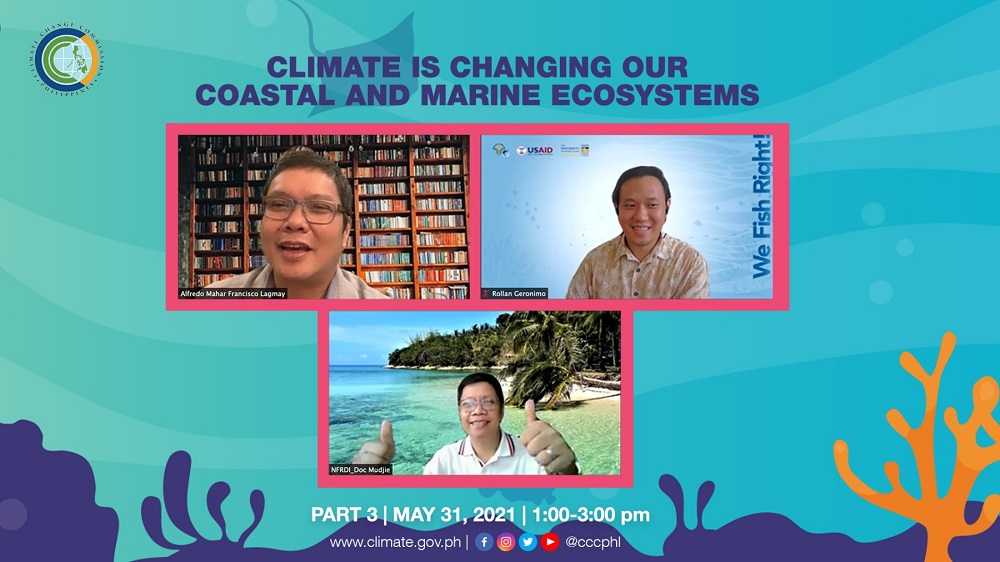
June 01, 2021 Tuesday

MANILA, 2 June 2021 — The third and final session of the “Climate Change is Changing our Coastal and Marine Ecosystems” webinar series shed light on the critical role of accurate scientific data sets translatable to understandable information in addressing the impacts of climate change on marine ecosystems.
The webinar was organized by the Climate Change Commission, in partnership with RARE Philippines, in celebration of May as the Month of the Ocean and gathered hundreds of participants consisting of members of the academe and research institutions in the Philippines and abroad, government agencies and local government units, policymakers, and organizations leading community-based initiatives, to build awareness on the current and the future state of marine and coastal ecosystems in the Philippines.
The virtual webinar featured presentations from Dr. Mahay Lagmay, Executive Director of the University of the Philippines Resilience Institute (UPRI); Mr. Rollan Geronimo, Fishing Specialist for the United States Agency for International Development (USAID) Fish Right Project; and Dr. Mudjekeewis D. Santos, Scientist IV from the National Fisheries Research Development Institute (NFRDI), on data analytics as framework to link climate change data and manage information for decisions, climate change and marine ecosystem modeling, and vulnerability assessment for fisheries and identified/recommended adaptive strategies.
"We hope that the shared stories, data and information from our experts and our stakeholders in this webinar series could facilitate climate and fisheries policies that are grounded and science-based. We hope that this information can be mainstreamed in the programs of our national government agencies, academe, and non-government organizations in ensuring that they are going to reach and be accessible and understandable for local government units, our fisherfolk, and all those who are most vulnerable to the impacts of climate change," said RARE Philippines Vice President Rocky Sanchez-Tirona in her opening remarks.
“In 2012, the Philippines launched the program NOAH or Nationwide Operational Assessment of Hazards, that put into place all of these weather data into a system - making use of the digital infrastructure to put the satellite data, the doppler data, the sensors, rain gauges, so that we can see all of these information in near realtime. By contouring all of those rainfall sensors, we can see where it's raining heavily at any point in time, we can match them with floods, and also the reports of the crowd who are experiencing floods, and try to validate and improve the science behind how we depict our flood, landslide and storm surge happens,” said Dr. Lagmay.
"We need to strongly support global calls for mitigation of greenhouse gas emissions. We've seen how the difference between 8.5 and the 4.5 scenarios is twice actually in terms of impact on our oceans and the seas around us. We need to maximize the use of all available tools to give us a range of plausible scenarios. We can't focus on just one tool and we need to use different tools,” said Mr. Geronimo.
“Whenever we look at our work or development plans at different levels, we should look at it under a climate lens - we should look at the vulnerabilities and the hazards. Otherwise, it might seem far away, instead of hitting our deliverables, it's too far because we don't have a climate lens,” said Dr. Santos.
The Department of Environment and Natural Resources-Biodiversity Management Bureau (DENR-BMB) reiterated the goal of mainstreaming coastal fisheries in the climate change programs and policies of the government at the international, national and local level, assess the impacts of climate change on the sector and build the resilience of the sector against the effects of climate change.
“As science continues to shape national policymaking and implementation programs, it is our duty to ensure dissemination of accurate scientific information translatable to communities' understanding towards their actions, thus, strengthening and widening the reach of our efforts to conserve and protect our coastal and marine resources,” said DENR-BMB Undersecretary for Special Concerns and OIC-Director Edilberto DC. Leonardo.
Moderated by Ms. Candeze Mongaya of RARE Philippines, the webinar series aims to provide the public a broader understanding of the importance of science and data for informed policies on oceans. This is aligned with the overall goal of the United Nations Decade of the Ocean Science for Sustainable Development (2021-2030) with the message, “The Science We Need for the Ocean We Want”. The full webinar can be accessed through this link: https://www.facebook.